- Home
- Lou Cameron
Stringer and the Hanging Judge
Stringer and the Hanging Judge Read online
STRINGER AND THE HANGING JUDGE
STRINGER SERIES #6
LOU CAMERON
STRINGER AND THE HANGING JUDGE
Copyright © 1988 by Lou Cameron.
First ebook edition copyright 2012 AudioGO. All Rights Reserved.
Trade ISBN 978-1-62064-150-7
Library ISBN 978-0-7927-9068-6
Cover photo © iStockPhoto/dmathies
STRINGER AND THE HANGING JUDGE
CONTENTS
CHAPTER ONE
CHAPTER TWO
CHAPTER THREE
CHAPTER FOUR
CHAPTER FIVE
CHAPTER SIX
CHAPTER SEVEN
CHAPTER EIGHT
CHAPTER NINE
CHAPTER TEN
CHAPTER ELEVEN
MORE EBOOKS BY LOU CAMERON
CHAPTER ONE
A dank summer fog with seaweed on its breath had crept in through the Golden Gate while most of the town was asleep. So the city room at the San Francisco Sun was ablaze with Edison bulbs, despite the nine A.M. hour when Stringer showed up. His crusty features editor, old Sam Barca, didn’t do or say one thing to dispel the gloom when Stringer joined him in the sort of frosted glass cage they kept old Sam in lest he jar the ears and fillings of the women, and some men, the Sun had hired since the Spanish-American War in the name of progress. Barca was a newspaperman of the old school, who only worried about pungent observations when they were spelled or punctuated wrong.
Stringer could tell old Sam was fixing to cloud up and rain all over somebody. So he grabbed a bentwood chair, took a seat, and commenced to roll a smoke as he hoped it wasn’t him.
It was. Old Sam began by calling Stringer a bull-headed bastardly idiot with an obvious longing for unemployment, and then he said, louder, “If I’ve told you once I’ve told you a million or more times to stay the hell away from Fort Mason, MacKail. What do you mean by turning in another two columns about our brave boys embarking two by two to civilize the Filipinos with their butt stocks and bayonets?”
Stringer licked his Bull Durham, sealed it tightly, and lit the resultant smoke. Then he shrugged. “Nobody has told me that our occupation of the Philippines was some kind of state secret,” he replied. “Teddy Roosevelt in the flesh was up at Fort Mason to send ‘em on their way with inspirational speeches, plural. He can’t stop after one speech, once he gets wound up. I feel sure more than one trooper felt mighty anxious to get aboard and below decks long before old T.R. got to reading them that cablegram from Rudyard Kipling, loud enough to rattle windows all along North Beach.”
Sam Barca grimaced, which didn’t make his leathery brown face look sweeter. “You had no call to poke fun at Rudyard Kipling either,” he snapped. “It’s sort of refreshing to find a son-of-a-bitching Limey who actually seems to approve of our Manifest Destiny in the Pacific, damn it.”
Stringer blew a smoke ring and raised an eyebrow as he peeked through it at old Sam. “I never made fun of the asshole,” he muttered. “I just ran his congratulations to us as he wrote it, in verse, for Pete’s sake.”
Barca looked uncertain. “Do you mean it was him and not you who referred to the Filipino rebels as half savage and half child?” But when Stringer nodded, Sam still insisted, “Forget it. You’re bucking the tide of public opinion again. How many times do I have to tell you that you’d be as big a journalist as Richard Harding Davis or your pal Jack London if only you’d slant your news items the way our readers want to read ‘em.”
“Slanted news isn’t news, Sam,” Stringer answered flatly. “If I hadn’t wanted to be an accurate reporter, I’d have never put myself through all those journalism courses at Stanford by herding cows on the side. I have to call things as I see them. It’s enough trouble writing fancier than I was ever taught to talk, when what I’m putting down on paper is true. If you don’t want to run my feature on those latest troop movements—”
“I want to but I can’t,” Barca cut in, adding, with a sigh, “I guess I was about your age when I covered Little Big Horn, as it looked to me at the time. They blue-penciled my accurate observation regarding the advantages of sending troopers armed with single-shot saddle carbines against Indians armed with repeaters, when the government knew its own Indian agency had issued the same to the Lakota Confederacy.”
“I fear Custer was a mite before my time,” Stringer said. “But if what you say is true, I’m sure I’d have written her that way as well.”
Barca nodded. “I know. That’s why I’m an editor today while you are a semiemployed stringer who’s fortunate as hell I think he has the makings of a newspaper man in him, when and if he ever wises up. Our readers don’t want to know our boys get to fight so good with their bayonets because the Krag is a lousy rifle. There’s no point informing ‘em that the notion of our picking up the white man’s burden sounds dumb, as soon as you ask who asked us to. The Philippine Insurrection is a popular war, son. Just like the war with Spain was. You’d have come back famous as Richard Harding Davis, for you’re a better writer, if only you’d cabled us more war coverage fit to print!”
Stringer blew smoke out his nostrils like an annoyed but pent-up bull. “The stuff I sent was true, Sam.”
Barca nodded. “That’s why we were afraid to print so much of it. While you were reporting we were losing more men to Yellow Jack and spoiled supplies than to Spanish bullets, Davis was reporting it as a Splendid Little War, and damn it, it was about as nice a war as we’re ever likely to see again. It was over before Congress could even consider a draft. The few men we sent in were all volunteers, and despite your gloom, we only lost a handful before we’d skunked the Spaniards, total, in less than four full months of fighting.”
Stringer looked disgusted. “Forty-odd-hundred casualties in less than four months adds up to more than a handful, Sam. I make her over a thousand a month, and history will bear me out, someday, that most of ‘em were the result of Yellow Jack or mismanagement.”
Barca sighed. “You can’t pay today’s bills with tomorrow’s historical footnotes. I’ve told you the kind of features I can pay you for. Not many newspapermen working out in the field today recall enough of the old west to matter, and Bat Masterson insists he’s a damned old sports writer now. I’m always ready to give you space rates on stuff with a wild west angle, son.”
Stringer swore softly. “Damn it, Sam.”
But Barca insisted, “Damn me no damns. I know we’ve somehow made it to the twentieth century and that you’d rather cover modern wonders involving Gibson Girls racing bikes in scandalous bloomer outfits. But like it or not, you did grow up on a cattle spread, and while the west these days may not be as wild as some say it was, outlaws, Indians, and Mexican border raiders are still up and at ‘em in some of our more backward areas. I liked that piece you turned in on the Wild Bunch a few weeks back, and I only had to blue pencil a few lines of that exposé you did on the myth of Buffalo Bill. The cuss is still around, and even if debunking paid off, we don’t like to get sued for slander.”
Stringer took a last drag on his suddenly bitter-tasting smoke and ground it out in the big glass ashtray on the desk between them. “All right,” he groaned. “It’s not roundup time, and the Wild Bunch hasn’t stopped another train since last we met. So name your pleasure, as long as it’s not another damned rodeo.”
Barca leaned back in his captain’s chair with a smile. “I’m not sure about what’s up, over near the Pecos, but I’ve gotten more than one tip that something’s up. Isn’t Bean a Scotch name, like yours, MacKail?”
Stringer nodded. “It would be pronounced midway between Bane and Vane in the old country. Gaelic spelling would be an editorial chore, indeed. Does it
matter, at this late date?”
Barca said, “It might, seeing you’re in a better position than say an Armenian to butter the old bastard up as a fellow Scot. You’ve heard of Judge Roy Bean, of course?”
Stringer laughed incredulously. “The only law west of the Pecos’? I keep hearing about him all the time. But on the other hand, I keep hearing about Deadwood Dick, and I know for a fact he’s a fictitious character in a western series put out in London, England.”
“Judge Roy Bean is real,” Barca said. “Taken with a grain of salt. He runs and just about owns the town of Langtry, Texas, née Vinegaroon, same place, when it was just a jerkwater stop on the Southern Pacific line.”
Stringer nodded. “I said I’d read some of the awful stories about him. Do you want me to find out how a self-styled judge gets away with rawhiding even a small Texas town this late in the game?”
Barca shook his head. “The legend about old Roy Bean just riding in after the Civil War to take the town over with his two big guns and even bigger mouth simply isn’t true, even if Bean himself prefers that version.”
The editor opened a desk drawer to grope out some carbons from the newspaper morgue. “Put these away and read ‘em later. I can’t abide it when you smirk about your elders. Suffice it to say, for now, Bean opened a general store in Vinegaroon shortly after the railroad decided it was a handy spot to stop for steam-water. There isn’t, or wasn’t, another town near enough to matter. So the Texas Rangers had Bean appointed the local justice of the peace. It saved them a lot of riding when they picked up petty criminals who could be let off with a fine or may haps a good scare. They say old Bean can look ferocious as hell when he’s not selling beer or ladies’ notions, and most of the saddle tramps the Rangers dragged in for Bean to scowl at were ignorant Mexicans or trash whites. His private town is just across the border from some mighty rough Mexican range, about where the Pecos and Rio Grande meet.”
“I know the country, and you’re right about it being rough,” Stringer said. “I think we stopped for water a few times at Langtry, Vinegaroon, or whatever, albeit there wasn’t anything there worth getting off the train to look at. How come old Bean enjoys such a rep as a hanging judge if he only holds office as a country J.P.?”
“He’s said to be a free thinker,” Barca replied, “and you know how some Army troopers act if someone gives `em one stripe. It’s an open question as to just how many, if any, Bean has actually strung up. Some say the gallows he put up between his store and corral are just rustic humor. More than one Mexican is convinced he just can’t abide border jumpers and hangs ‘em high with little or no formality. It may be true. It may just be the way the overworked and underpaid Texas Rangers want wetbacks to feel. If you can convince yourself and our readers that the old fart’s hung as many men as the real Judge Parker hung in Fort Smith before they made him stop, I’ll buy it.”
Stringer looked pained. “Hell, I don’t have to ride all the way east of the Big Bend just to make up a blood-and-thunder feature about a windy old Texican. I can type her up on my Remington grasshopper tonight and have it for you by this time tomorrow.”
Sam Barca shook his head. “So could I. The Sun just doesn’t pay good money for potboilers cribbed from the morgue. I was about to say, before you commenced jumping to conclusions, that there’s more to this lead than crazy old Roy Bean and his delusions of reliability. He may or may not be willing to fill another crazy Scotch cowboy in on the more important storm that seems to be brewing by the Big Bend. He was up to his wry neck in it the last time, and damned near lost his position of J.P. as a result.”
Stringer perked up a bit more, which still wasn’t saying much. “What sort of trouble did he get into, seeing Texas isn’t all that worried whether he hangs folk or not?”
Barca pursed his lips to read the dates in his own memory before he replied, “It was the summer of ‘96, I think. Promoters had arranged a bare knuckles match between Bob Fitzsimmons and the less well-known Peter Maher. Their only real problem was a place to stage the bout. It had to be handy to a railroad stop if they expected to draw any crowd at all. On the other hand, bare-knuckle boxing had just been outlawed in Texas after a few sissies died in the ring.”
Stringer nodded. “Right. Langtry is easy to get to by rail, from east or west, and you just said Roy Bean was the only local law. Get to the interesting parts.”
Sam Barca chuckled dryly. “I’d say it was more amusing than interesting, in the end. The bout was held aboard a raft moored in the middle of the Rio Grande. Some Mexicans wanted to bet on Fitzsimmons, and I don’t know who they got to bet on poor Pete Maher. Fitzsimmons kicked the shit out of him, or to be fair, he beat Maher half to death with his bare fists. Then the Texas Rangers arrived to arrest everyone involved.”
“Including their own Judge Bean?” Stringer asked.
Barca laughed. “Not hardly. They made the mistake of hauling victor, vanquished, and vultures before Roy Bean, so that he could slap ‘em with a good fine the Rangers had no doubt sort of spent in advance. To this day there’s some argument as to whether Bean had been fixed or whether he was just the contrary old cuss he says he is. He let everyone off. The Rangers were mad as hell. But since it had been their notion to haul their prisoners before Judge Bean in the first place, there wasn’t a thing they could do about it but belly-up for a beer and say no more about it.”
Stringer whistled softly and observed, “That sounds sort of raw, even for West Texas as late as ‘96.”
Barca nodded but said, “Bean proved his point when they hauled him before a higher county court to explain his ruling. They say he’s got one law book and one bible, King James edition. Whether he can read either is up for grabs. But to give the old devil his due, he must have a basic grasp of Common law. The higher court had to back him when he pointed out that since the bare-knuckle fight had occurred in the middle of the Rio Grande, Texas had no jurisdiction in the matter, whether such sporting events were lawful in Texas or not.”
Stringer laughed. “What did Mexico have to say about it? The raft had to be in one fool country or another.”
Barca shrugged. “Hell, son, they allow gents in fancy pants to stab cows on Sunday down Mexico way. There wasn’t any Mexican law involved anyway. As I said, Langtry, as it’s now called, faces a lot of Mexican nowheres on the far side of the river. They do say, however, that old Roy Bean was able to buy an ice machine right after the Fitzsimmons-Maher fight. He sells ice-cold beer and that new sticky soda, Coca-Cola, to passengers on the trains passing through, these days.”
Stringer got to his feet. “I think I see what you want me to look into. But Scotch or Swedish, I can’t see old Bean confessing malfeasance in office on even a back page of the Sun. The case goes back beyond the statute of— Hold on. If we’re running it as human interest, the old windbag might enjoy yet another disgusting tale about him, seeing nobody can touch him now, with seven years gone under the bridge.”
Barca shook his head. “You could rehash that transgression without leaving your hired digs on Rincon Hill, Stringer. I want something new on the old rascal. I’ve received more than one tip about something even wilder than the Fitzsimmons-Maher fight brewing up in Langtry. If passengers inhaling beer or Coca-Cola long enough for their locomotive to water up have heard such rumors, the old rogue who presides over the whole shebang has to have heard more. I want you to get your skinny Scotch ass over to Langtry, butterscotch the old Scotch bastard up, and see what the hell is up.”
“Remind me to meatball you the next time I ask for an advance,” Stringer said. “Cracks about Scotchmen seem tedious as hell to a man raised cow on the Mother Lode range. Aside from that, I just now remembered something. Some of my elders did take all that stuff about belonging to bagpipes and playing clans sort of serious. It just now came back to me that back in the old country, my clan and Clan MacBean were at war with each other a heap.”
Sam Barca shrugged. “In that case,” he suggested, “mayhaps you’d
best tell him you’re Irish and hope he’s not up on all that feuding and fussing in kilts. Roy Bean doesn’t need a clan to come after anyone. He owns the whole damned town of Langtry.”
CHAPTER TWO
A snot-nosed little kid blurted, “Mama, look at the cowboy!” as Stringer made his way down the swaying aisle of their coach car, toting his possibles in a surplus Army kit bag and dressed sensibly for a long, hot, and dusty trip. He could have told the kid and his velveteen-clad mama that the blue denim jeans and jacket he wore betwixt his old Rough Rider hat and scuffed but well broken-in Justins wasn’t intended to make anyone look like Buffalo Bill. Stringer had grown up wearing the work duds of the honest cowhand, and to date had never found a more practical outfit for working in the field. It figured to save him uninvited dancing lessons as he got on and off trains farther along the line too. The west coast had become so civilized of late that people stared at an innocent stranger wearing a black silk bandana instead of a sissy bow tie. But from L.A. east to West Texas, the southwest was still a mite rustic.
Stringer couldn’t find a seat in the first smoking car, damn the sissy on the S.P. board of directors who’d come up with such newfangled notions. Before the turn of the century, when they still had to leave all the coach windows open, a good cigar smelled refreshing next to all the coal smoke everyone got to inhale whether they smoked or not. Now the Coaster ran with its infernal windows shut while filtered roof vents tried to provide air more suited to Calvinist notions of purity. He knew that before they made it half way to L.A., that mama’s fancy dress would be a sweat-grimed mess. That was why he had to find an uncrowded smoker.
Not that Stringer was a heavy smoker. A man who preferred roll-your-owns to tailor-mades couldn’t chain smoke and do anything else at the same time. He’d learned to travel smoker of late simply because they didn’t fuss at you for cracking open a window in a car hazed sort of blue. The next car was crowded, albeit less so, simply because lots of others who rode the Coaster regular preferred some elbow breeze to dry their sweat as they rode. The timetable assured one and all that L.A. was an eight-hour trip. Stringer had yet to see the S.P. live up to that brag.

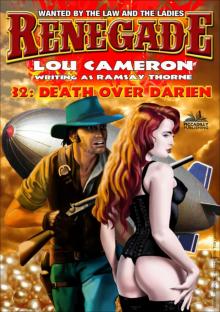 Renegade 32
Renegade 32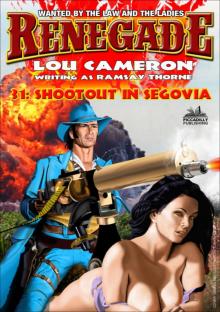 Renegade 31
Renegade 31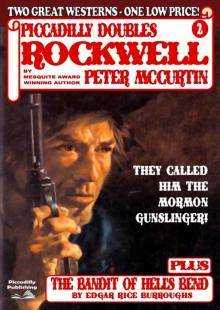 Piccadilly Doubles 2
Piccadilly Doubles 2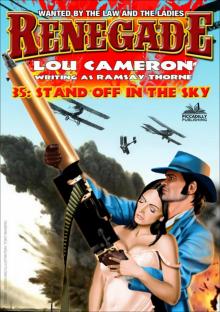 Renegade 35
Renegade 35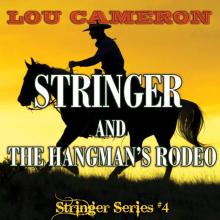 Stringer and the Hangman's Rodeo
Stringer and the Hangman's Rodeo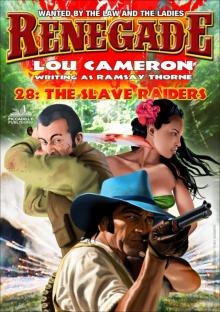 Renegade 28
Renegade 28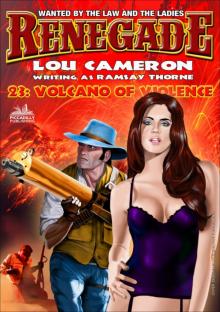 Renegade 23
Renegade 23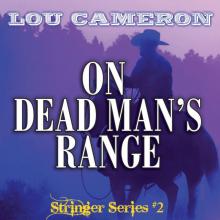 On Dead Man's Range
On Dead Man's Range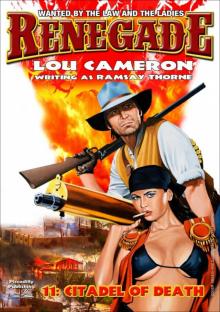 Citadel of Death (A Captain Gringo Western Book 11)
Citadel of Death (A Captain Gringo Western Book 11)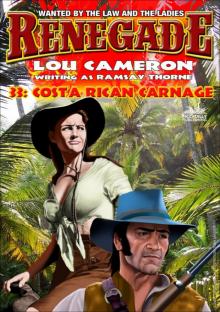 Renegade 33
Renegade 33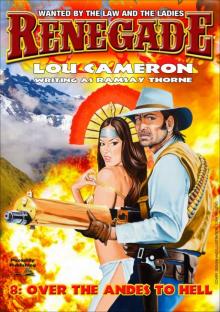 Over the Andes to Hell (A Captain Gringo Western Book 8)
Over the Andes to Hell (A Captain Gringo Western Book 8)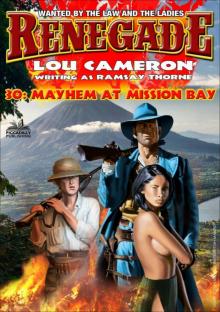 Renegade 30
Renegade 30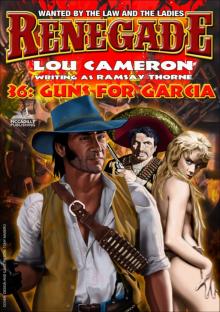 Renegade 36
Renegade 36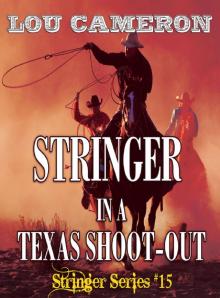 Stringer in a Texas Shoot-Out
Stringer in a Texas Shoot-Out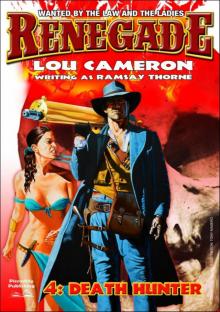 The Death Hunter
The Death Hunter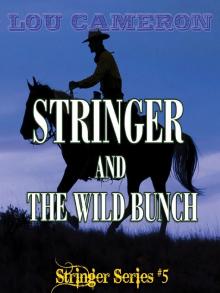 Stringer and the Wild Bunch
Stringer and the Wild Bunch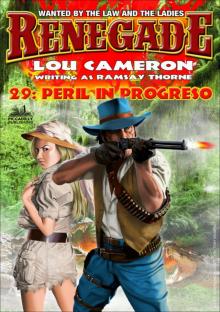 Renegade 29
Renegade 29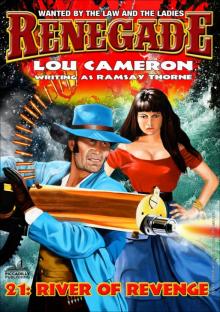 Renegade 21
Renegade 21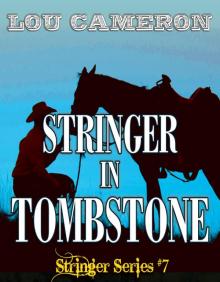 Stringer in Tombstone
Stringer in Tombstone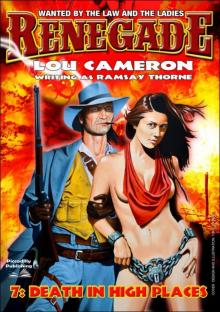 Death in High Places (A Renegade Western Book 7)
Death in High Places (A Renegade Western Book 7)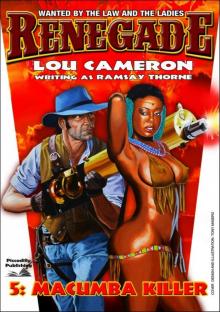 Macumba Killer
Macumba Killer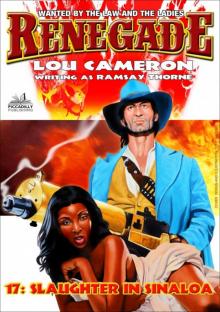 Renegade 17
Renegade 17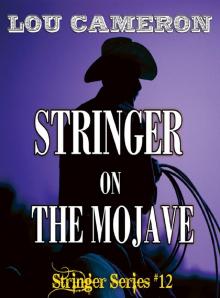 Stringer on the Mojave
Stringer on the Mojave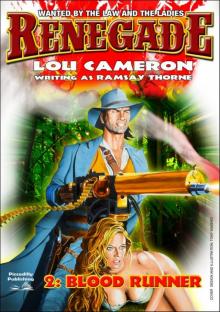 Blood Runner
Blood Runner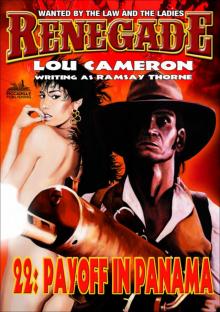 Renegade 22
Renegade 22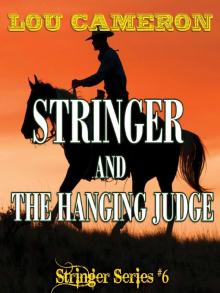 Stringer and the Hanging Judge
Stringer and the Hanging Judge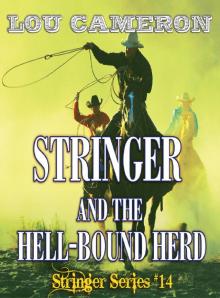 Stringer and the Hell-Bound Herd
Stringer and the Hell-Bound Herd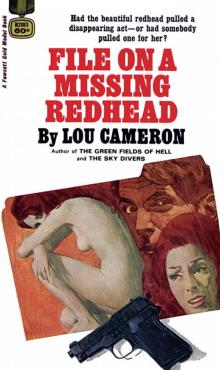 File on a Missing Redhead
File on a Missing Redhead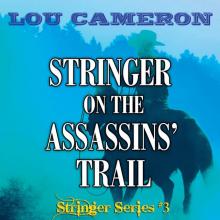 Stringer on the Assassins' Trail
Stringer on the Assassins' Trail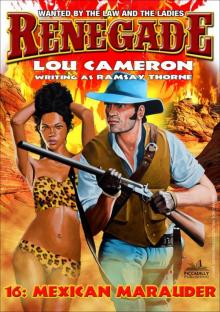 Mexican Marauder (A Captain Gringo Adventure #16)
Mexican Marauder (A Captain Gringo Adventure #16)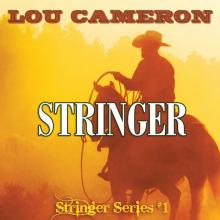 Stringer
Stringer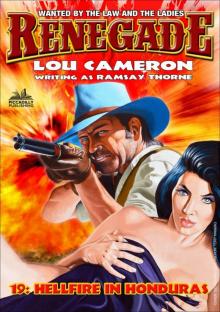 Renegade 19
Renegade 19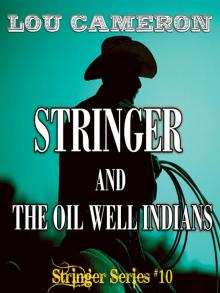 Stringer and the Oil Well Indians
Stringer and the Oil Well Indians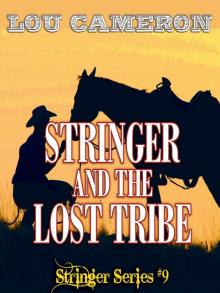 Stringer and the Lost Tribe
Stringer and the Lost Tribe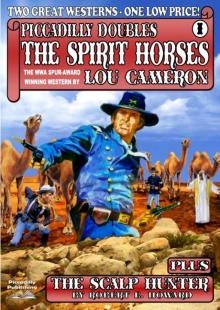 Piccadilly Doubles 1
Piccadilly Doubles 1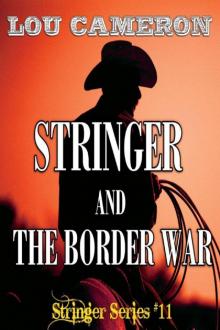 Stringer and the Border War
Stringer and the Border War Renegade
Renegade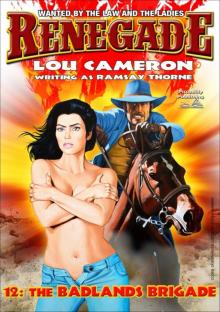 The Badlands Brigade (A Captain Gringo Adventure Book 12)
The Badlands Brigade (A Captain Gringo Adventure Book 12)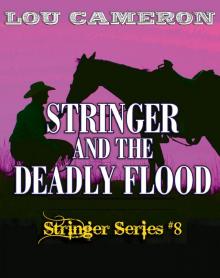 Stringer and the Deadly Flood
Stringer and the Deadly Flood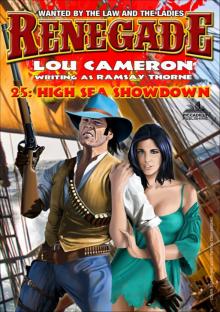 Renegade 25
Renegade 25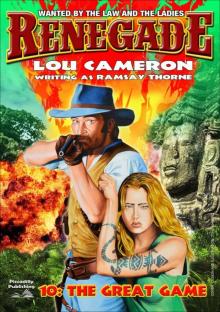 The Great Game (A Captain Gringo Western Book 10)
The Great Game (A Captain Gringo Western Book 10)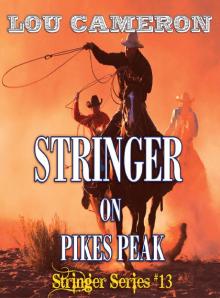 Stringer on Pikes Peak
Stringer on Pikes Peak